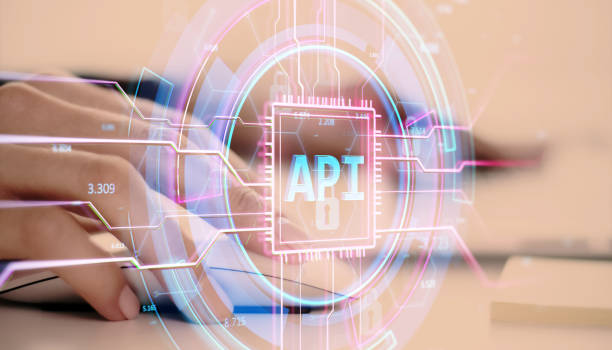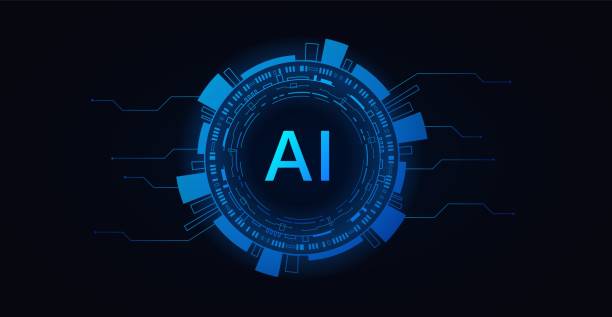What is Artificial Intelligence and What are its Applications?

Artificial Intelligence (AI) is a branch of computer science that focuses on building machines and systems capable of performing tasks that typically require human intelligence.
These tasks include learning, problem-solving, pattern recognition, natural language understanding, and decision-making.
To better understand #Artificial_Intelligence, we must know that its main goal is to create systems that can operate autonomously and intelligently.
This means that machines should be able to learn from data, analyze their experiences, and make new decisions based on them.
The applications of artificial intelligence are vast and diverse, affecting almost all industries and aspects of our lives.
Some of the most important applications of artificial intelligence include:
- Medicine Disease diagnosis, drug development, robotic surgery
- Automotive Autonomous vehicles, driver-assistance systems
- Finance Fraud detection, risk management, algorithmic trading
- Education Personalized learning systems, automatic assignment grading
- Manufacturing Production line automation, quality control
- Marketing Customer behavior analysis, targeted advertising
This is just a fraction of the numerous applications of Artificial Intelligence, and with the continuous advancement of this technology, we will witness its further expansion in our daily lives.
Disappointed with your e-commerce site’s low conversion rate? Rasawab transforms your online store into a powerful tool for attracting and converting customers!
✅ Significant increase in visitor-to-buyer conversion rates
✅ Unparalleled user experience to boost customer satisfaction and loyalty⚡ Get free consultation from Rasawab!
The History and Evolution of Artificial Intelligence

The idea of artificial intelligence dates back to the 1950s when scientists like Alan Turing and John McCarthy became interested in the possibility of building machines that could think.
In 1956, a conference was held at Dartmouth College, which is considered the official starting point for research in artificial intelligence.
In the early decades, the focus was on solving logical problems and creating programs that could play games like chess.
However, over time, it became clear that creating truly intelligent systems presented far greater challenges.
The 1970s and 1980s are known as the “AI winter” periods because, due to a lack of resources and hardware limitations, progress slowed down, and many projects were halted.
But in the 1990s, with the increase in computer processing power and the emergence of new algorithms like artificial neural networks, AI revived.
Today, we are witnessing significant advancements in fields such as deep learning, natural language processing, and computer vision.
The history of artificial intelligence shows that this technology has traveled a challenging path, but still holds immense potential to change the world.
Key Concepts in Artificial Intelligence

To better understand artificial intelligence, we must become familiar with some of its key concepts:
- Machine Learning: A branch of artificial intelligence that allows machines to learn from data without explicit programming.
- Deep Learning: A subset of machine learning that uses artificial neural networks with multiple layers to analyze data.
- Natural Language Processing: Enables machines to understand and generate human language.
- Computer Vision: Allows machines to see and interpret images and videos.
- Artificial Neural Networks: Mathematical models inspired by the structure of the human brain, used for learning and processing information.
These concepts form the main foundations of modern artificial intelligence and play a crucial role in many of its applications.
For example, in facial recognition systems, computer vision and deep learning are used to identify individuals in images.
Also, in machine translation systems, natural language processing is used to understand and translate text.
| Key Concept | Description |
|---|---|
| Machine Learning | Allows machines to learn from data |
| Deep Learning | Uses artificial neural networks to analyze data |
Types of Artificial Intelligence Based on Capabilities

Artificial intelligence can be categorized into several types based on its capabilities:
- Narrow AI: This type of artificial intelligence is only capable of performing specific and limited tasks.
Most of today’s AI systems fall into this category. - General AI: This type of artificial intelligence is capable of performing any task a human can do.
No general AI system currently exists. - Super AI: This type of artificial intelligence surpasses human intelligence and is capable of solving problems that humans are unable to solve.
This type of AI is still theoretical.
Currently, most efforts in artificial intelligence are focused on developing narrow AI.
However, many researchers and scientists are seeking to achieve general AI and even super AI.
Achieving these levels of artificial intelligence could bring about immense transformations in human lives, but simultaneously, it also entails serious risks and challenges.
Tired of your e-commerce website not generating as much revenue as it could for you? Rasawab, specializing in professional e-commerce website design, solves this problem permanently!
✅ Increase sales rate and revenue
✅ High loading speed and unparalleled user experience
⚡ Get free consultation for e-commerce website design
Applications of Artificial Intelligence in Various Industries

As mentioned, the applications of artificial intelligence are vast and diverse.
In this section, we will explore some of its most important applications in various industries:
- Medicine Early disease diagnosis, new drug development, robotic surgery, medical record management
- Finance Fraud detection, risk management, algorithmic trading, provision of financial advisory services
- Manufacturing Production line automation, quality control, equipment failure prediction, supply chain management
- Transportation Autonomous vehicles, route optimization, traffic management, provision of intelligent transportation services
- Agriculture Crop monitoring, plant disease detection, irrigation optimization, water resource management
This is just a part of the applications of artificial intelligence across various industries.
With the continuous advancement of this technology, we will witness its further expansion into other industries and sectors.
The use of artificial intelligence in these industries leads to increased productivity, reduced costs, and improved quality of products and services.
AI in Healthcare is an example of these positive impacts.
Challenges and Limitations of Artificial Intelligence

Despite significant advancements in artificial intelligence, this technology still faces serious challenges and limitations:
- Need for large datasets Many AI algorithms require a very large volume of data for proper learning and performance.
- Interpretability problem Understanding how an AI system arrived at a particular result can be very difficult.
- Bias If the training data of an AI system contains bias, the system will also exhibit bias.
- Ethical issues The use of AI can raise serious ethical concerns, such as issues related to privacy, discrimination, and accountability.
- Cost Developing and implementing AI systems can be very expensive.
These challenges and limitations prevent the rapid and unrestrained expansion of artificial intelligence.
To overcome these challenges, further research, development of new algorithms, and the creation of appropriate legal and ethical frameworks are needed.
The Future of Artificial Intelligence and its Impact on Society

Artificial intelligence holds immense potential to change the world and improve human lives.
With the continuous advancement of this technology, we will witness significant transformations in various industries, lifestyles, and social interactions.
Some of the most important impacts of artificial intelligence on society include:
- Job automation Many repetitive and routine jobs will be automated by AI systems.
- Creation of new jobs AI will also create new jobs, such as those related to the development, maintenance, and training of AI systems.
- Improved quality of life AI can help improve the quality of human lives, such as providing better healthcare services, personalized education, and smart transportation.
- Increased productivity AI can help increase productivity in various industries, such as automating production lines, optimizing processes, and reducing costs.
However, it must be noted that artificial intelligence also carries serious risks and challenges.
To manage these risks and challenges, cooperation between governments, industry, and society is needed.
The future of artificial intelligence requires attention to ethical and social issues.
| Impact | Description |
|---|---|
| Job automation | Many jobs will be automated by AI systems |
| Creation of new jobs | New jobs will be created in the development and maintenance of AI systems |
How to Learn Artificial Intelligence?

If you are interested in learning artificial intelligence, there are various ways to get started:
- Online courses Many online learning platforms offer various courses in artificial intelligence.
- Books and articles There are many books and articles on artificial intelligence that you can use for learning.
- Practical projects The best way to learn artificial intelligence is by undertaking practical projects.
- Attending conferences and workshops Participating in AI conferences and workshops is an excellent opportunity to learn from experts and connect with other enthusiasts.
To start, you can begin by learning the basic concepts of artificial intelligence, such as machine learning, deep learning, and natural language processing.
Then, you can learn a programming language like Python and start working on practical projects.
Numerous AI learning resources are available.
Tired of your e-commerce website not generating as much revenue as it could for you? Rasawab, specializing in professional e-commerce website design, solves this problem permanently!
✅ Increase sales rate and revenue
✅ High loading speed and unparalleled user experience
⚡ Get free consultation for e-commerce website design
Artificial Intelligence in Iran: Current Status and Outlook
![]()
In Iran, too, attention to artificial intelligence has increased in recent years.
The government and private sector have made investments in the development and implementation of AI systems.
Some of the most important applications of artificial intelligence in Iran include:
- Agriculture Crop monitoring, plant disease diagnosis, irrigation optimization
- Medicine Early disease diagnosis, provision of online consultation services
- Industry Production line automation, quality control
- Transportation Traffic management, provision of intelligent transportation services
However, Iran is still lagging behind many developed countries in the field of artificial intelligence.
To compensate for this lag, more investment in research and development, training of specialized personnel, and creation of appropriate infrastructure are needed.
The outlook for artificial intelligence in Iran seems bright, but more efforts are required to realize this vision.
Key Points for Responsible Use of Artificial Intelligence

Artificial intelligence is a powerful tool that can be used for both good and bad purposes.
For responsible use of artificial intelligence, the following points should be considered:
- Transparency AI systems should be transparent, and their operational methods understandable.
- Accountability It must be determined who is responsible for the consequences of using AI systems.
- Fairness AI systems should not be discriminatory and should treat all individuals fairly.
- Privacy AI systems must protect individuals’ privacy.
- Security AI systems must be secure and protected against cyberattacks.
By observing these points, artificial intelligence can be used responsibly, and its benefits reaped.
Responsible AI is the key to a bright future.
The responsible use of this technology in artificial intelligence can be groundbreaking
Frequently Asked Questions
| Question | Answer |
|---|---|
| What is the definition of Artificial Intelligence (AI)? | It is a field in computer science that aims to create intelligent machines capable of thinking, learning, solving problems, and making decisions like humans. |
| Mention some common applications of Artificial Intelligence. | These include self-driving cars, voice assistants (such as Siri and Alexa), recommendation systems (such as Netflix and Amazon), facial recognition, and medical diagnosis. |
| What is the difference between Narrow AI (ANI) and General AI (AGI)? | Narrow AI is specialized in a single, specific task, while General AI possesses human intellectual ability to perform any cognitive task. |
| What is Machine Learning and its relationship to Artificial Intelligence? | Machine Learning is a branch of Artificial Intelligence that focuses on developing algorithms that allow systems to learn from data without explicit programming. |
| What are Artificial Neural Networks? | They are computational models inspired by the structure and function of the human brain, used in deep learning to process data and discover complex patterns. |
| Mention some ethical challenges related to Artificial Intelligence. | These include privacy issues, bias in data and algorithms, job displacement, and accountability in the event of errors or unfair decisions. |
| What is Natural Language Processing (NLP)? | It is a branch of Artificial Intelligence that focuses on enabling computers to understand, interpret, and generate human language in a useful and interactive way. |
| How can Artificial Intelligence affect the job market? | It can lead to the automation of some routine tasks, requiring the retraining of workers and creating new jobs in the areas of designing, developing, and maintaining AI systems. |
| What is Computer Vision? | It is a field in Artificial Intelligence that enables computers to “see,” understand, and interpret images and videos in the same way humans do, allowing them to recognize objects and faces. |
| What is the importance of data in developing Artificial Intelligence systems? | Data is the fuel that powers Artificial Intelligence systems, especially in machine learning. The quality and quantity of data significantly affect the accuracy and performance of models and their ability to learn and make correct decisions. |
And other services of Rasawab Advertising Agency in the field of advertising
Smart Reportage: A dedicated service for improving SEO ranking based on user experience customization.
Smart Marketplace: Revolutionize sales growth with the help of user experience customization.
Smart Digital Advertising: A combination of creativity and technology to attract customers through marketing automation.
Smart Data Analysis: An innovative platform for improving user engagement with custom programming.
Smart Advertising Campaign: A new service to increase click-through rates through SEO-driven content strategy.
And over hundreds of other services in the field of internet advertising, advertising consultation, and organizational solutions
Internet Advertising | Advertising Strategy | Advertorials
Resources
Artificial Intelligence on Wikipedia
AI Guide on Digikala Mag
Latest AI News on Zoomit
What is Artificial Intelligence? on Sanaati.ir
To reach the pinnacle of success in the digital space, Rasawab Afarin Digital Marketing Agency is with your business, offering specialized services such as SEO-optimized website design.
📍 Tehran, Mirdamad Street, next to the Central Bank, South Kazeroon Alley, Ramin Alley, Plaque 6


